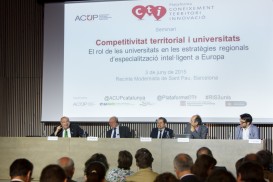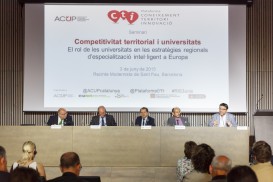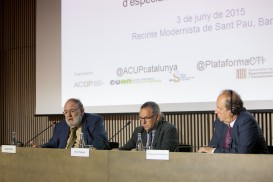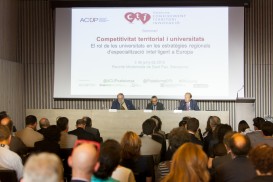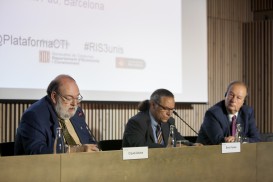The CTI Platform analyses the role of universities in regional smart specialization strategies in Europe
On Wednesday, June 3, the seminar ‘Territorial Competitiveness and Universities. The Role of Universities in Regional Smart Specialization Strategies in Europe' was held in the Art Nouveau Site in Barcelona. The Knowledge, Territory and Innovation Platform organized the conference. The member universities of the Catalan Association of Public Universities (ACUP), Foment del Treball Nacional and Petita i Mitjana y Empresa de Catalunya (PIMEC) with the support of Obra Social “la Caixa”, the Catalan Government and a group of Catalan institutions and companies based in Catalonia promote the CTI Platform.
Universities play an increasingly important role in economic, social, technological and cultural development of regions. The new Cohesion Policy framework puts specialization strategies (RIS3) at the core of regional development. In this context, universities and regions have a unique opportunity to create partnerships with the business sector to maximize the use of Structural and European Investment Funds (ESIF).
The seminar delved into the mentioned issues stressing the importance of governance stakeholders and partnerships. It was based on the high level conference that the Smart Specialisation Platform (S3P) and the European University Association (EUA) held in Brussels in June 2014, focused on the European universities’ mobilization in the intel3ligent specialization context (Smart Specialisation). The main objective of the Barcelona’s seminar was to analyse the role of universities in the RIS3 implementation and to know first hand cases of European regions in which the participation of universities is a key success factor in regional development.
Enric Fossas, president of the Catalan Association of Public Universities (ACUP) and rector of the Universitat Politècnica de Catalunya (UPC) opened the seminar with a CTI Platform presentation. Next, Wolfgang Streitenberger, advisory director of the Directorate-General for ‘Regional Policy and Urban Development’ of the European Commission explained the role of universities in promoting their respective territories. Finally, Claudi Alsina, general secretary of the Inter-University Council of Catalonia, on behalf of the Catalan Government, emphasised that “our universities are the main innovative agent of the system and so it is crucial to empower them”.
The first roundtable ‘European Regional Policy and the Strategic Role of Universities. State of Affairs’ of the seminar consisted of: John Goddard, emeritus professor of Regional Development Studies at Newcastle University; Mario Cervantes, chief economist of the Division of Country Studies and Perspective, Directorate for Science, Technology and Innovation of the OECD; José Carlos Gómez Sal, R&D commission president of CRUE and Rector of the Universidad de Cantabria; and Marcelino Cabrera of the Smart Specialisation Platform, Joint Research Centre of the European Commission. The moderator was Marcel Prunera, strategy and regional competitiveness specialist.
In his speech, Goddard argued that “regional governments have not quite understood the importance of universities for their territories” and pointed to the importance of “uniting companies, universities, governments and civil society in a single strategy”. On the other hand, Cervantes said that “universities should seek funding beyond the one coming from the state governments because the investment of the latters is in decline”. Afterwards, Gómez Sal denied that universities are locked in an ivory tower. “They keep an eye on companies and society” he defended. And he added that, in general, “the Spanish universities are anxious to see the regional government’s proposals on RIS3”. In this sense, Cabrera, intervened to expose that "the university has a unique position to involve civil society in the RIS3 and it is a prominent actor of social innovation".
After a fruitful exchange of views, the second roundtable focused on ‘The Implementation of the RIS3 in European Regions and Cities’ with the participation of Albert Carné, general director of Policy and Economic Development of the Government of Catalonia; Marc Sanmartí of the Economic Growth Office of the Barcelona City Council; Jesús Maria Peña Martínez, general secretary of the Presidency of the Basque Government and Mari Jose Aranguren, CEO of Orkestra (Basque Institute for Competitiveness); Taina Tukiainen, senior researcher at Aalto University, Finland; Ioannis Kesanlis, technical manager of the Special Management Authority of the Operational Program of the regional government of Greek Macedonia and Thrace; and Kevin Kane, business director of the International Public Policy Institute of the University of Strathclyde. During the roundtable speakers presented the particular cases of the various European regions. Afterwards three groups were organised in which participants discussed specific issues, identified possible solutions and proposed ways to implement them.
Finally, Francesc Xavier Grau, academic director of the Global University Network for Innovation (GUNi), presented the conclusions of the seminar. Among others, Grau stressed that “globalization pushes us towards regionalization and universities have a central role in this process”. He also noted that “the Catalan government should seek the involvement of Catalan universities to establish the RIS3 strategy”. Wolfgang Streitenberger closed the seminar with a demand: “instead of complaining, put in value the work done by the universities”.
